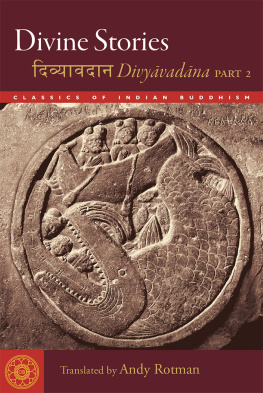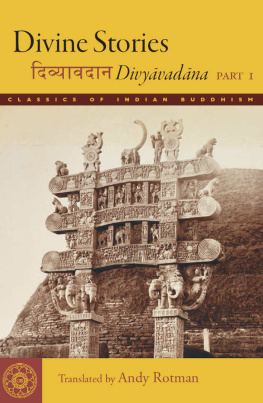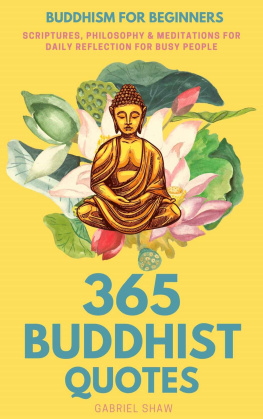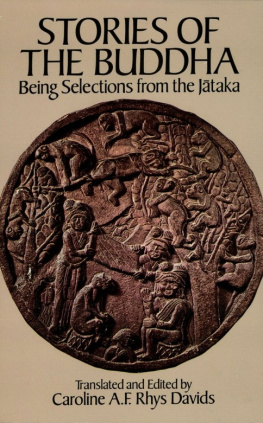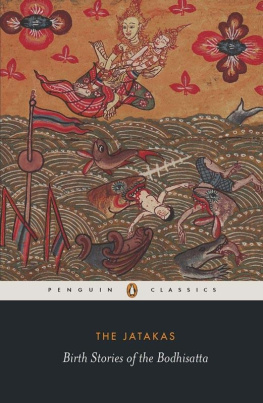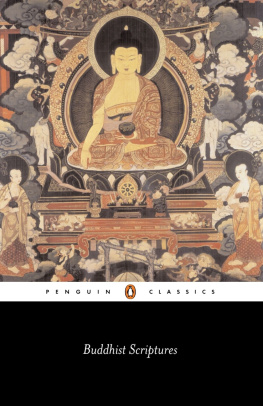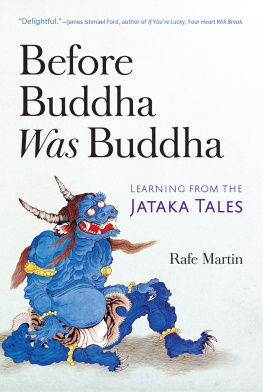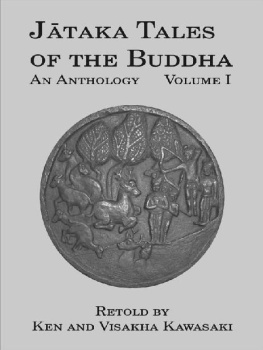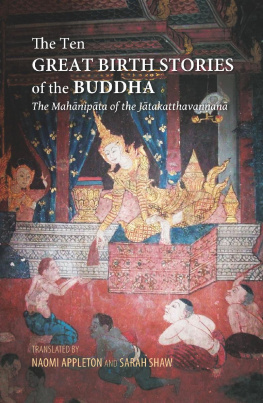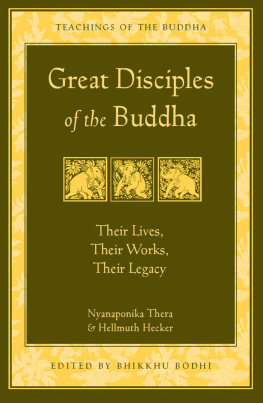MORE PRAISE FOR
Divine Stories, PART 2
These stories are vivid reminders that Buddhism is much more than a collection of philosophical abstractions or a bare-bones meditative technique for altering our neurobiology. Here we see the Buddhas teachings firmly anchored in their natural habitat, shaping lives by opening us up to the sorrows and joys of others. In pondering the depths of the human soul, they invite us to examine our assumptions about the hidden springs of desire and fear, and what motivates us to think, speak, and act in the way we do.
C. W. HUNTINGTON JR., author of Maya
The Divyvadna interrupts the assumption that Buddhist literature is technical and devoid of drama. These stories are full of big questionsof choice and consequence, love and powerharrowing events, and unexpected turns. These Buddhist texts reveal storytelling and teaching at its narrative best, and Andy Rotman has translated them with unparalleled love and dedication.
AKINCANO M. WEBER, guiding teacher, Atammaya Cologne
Those who devoured the first volume of Divine Stories will delight in this fresh batch of adventures and misadventures, each illustrating the twisting karmic bonds of a host of comic, tragic, evil, mundane, and divine characters. Pairing profundity with playfulness, Rotmans precise translations of these historically important tales not only captivate, they also remind us of the power of stories to shape humans and the worlds they inhabit. An exhilarating storytelling tour de force!
SARA MCCLINTOCK, Emory University
CLASSICS OF INDIAN BUDDHISM
The flourishing of Buddhism in South Asia during the first millennium of the Common Era produced many texts that deserve a place among the classics of world literature. Exploring the full extent of the human condition and the limits of language and reason, these texts have the power to edify and entertain a wide variety of readers. The Classics of Indian Buddhism series aims to publish widely accessible translations of important texts from the Buddhist traditions of South Asia, with special consideration given to works foundational for the Mahyna.
Editorial Board
Andy Rotman (chair), Smith College
Paul Harrison, Stanford University
Jens-Uwe Hartmann, University of Munich
Sara McClintock, Emory University
Parimal Patil, Harvard University
Akira Sait, University of Tokyo
THE DIVYVADNA
The Divyvadna is a large collection of Indian Buddhist stories written in Sanskrit from the early centuries of the Common Era. These stories have frequently been used in the moral education of monastics and laypeople, and they have often been considered to be the word of the Buddha himself. These stories have since spread throughout Asia, as both narrative and narrative art, leaving an indelible mark on Buddhist thought and practice. Representations of these stories can be found across Asia, from Kizil in China to Sanchi in India to Borobudur in Indonesia. It is not hyperbole to say that these are some of the most inuential stories in the history of Buddhism. This volume contains stories from the second half of the collection.
E xplore this second volume of translations, in vivid prose, from one of the most celebrated collections of ancient Buddhist stories.
Actions never come to naught,
even after hundreds of millions of years.
When the right conditions gather and the time is right,
then they will have their effect on embodied beings.
ANCIENT BUDDHIST LITERATURE is filled with tales of past lives. The Buddha, surrounded by his followers, is asked how it came to be that a certain person has met a particular fate. With his omniscience, the Buddha looks into eons past and uncovers the events that led to the present outcome and foretells the future as well. With stories of wicked wives, patricidal princes, and shape-shifting serpents, Divine Stories offers a fascinating illustration of the law of karmathe truth that the power of good and bad deeds is never lost. These are some of the oldest Buddhist tales ever committed to writing, illuminating the culture of northern India in the early centuries of the common era and bringing to life the Buddhist values of generosity and faith.
Andy Rotmans evocative translation combines accuracy with readability, with detailed editorial notes comparing readings in various Sanskrit, Pali, and Tibetan sources. Divine Stories is a major contribution to Indian and Buddhist studies.
The Buddha was a skillful and inveterate storyteller who understood the enduring power of narrative to entertain, engage, and enlighten. In his beautiful translation, Andy Rotman ensures the transmission of these divine and very human stories to a new generation of readers.
Ruth Ozeki, author of A Tale for the Time Being
To Ida Rose and Janna Rose,
sublime gifts for the world
Publishers Acknowledgment
The publisher gratefully acknowledges the generous help of the Hershey Family Foundation in sponsoring the production of this book.
Preface
Actions never come to naught,
even after hundreds of millions of years.
When the right conditions gather and the time is right,
then they will have their effect on embodied beings.
The Divyvadna
T HE Divyvadna is a classic, and it is a pleasure that this second installment of translations from the collection can likewise find a home in Wisdom Publications Classics of Indian Buddhism series. The title of the text notwithstanding, the divine stories in this collection are also deeply human, recording the trials and successes of ordinary people as they struggle to live good lives, with special attention given to their spiritual development. But these are also stories of charlatans, sages, and sea monsters, feasts and famines, the miraculous and the mundane, deadly sacrifices and stupendous gifts, incest and celibacy, evil ministers and wise rulers, wise ministers and evil rulers. These stories deal with big, meaningful questions: poverty and moral agency, political power and corruption, love and lust, death and the afterlife. They are stories to ponder deeply.
While one can claim, as I do in the introduction to Divine Stories, Part 1, that these are some of the most influential stories in the history of Buddhism and talk about their importance to the fields of art, law, literature, and the like, The stories in the Divyvadna, McClintock argues (and I wholeheartedly agree), are a perfect vehicle for this exercise.
This volume contains translations of many, but not all, of the stories in the second half of the Divyvadna. The original plan was that Joel Tatelman would translate these other stories, but owing to unforeseen circumstances, this plan couldnt come to fruition. Divine Stories, Part 1, contained stories 117. Contained here are stories 1825, 3132, and 3437. Missing are stories 2630, 33, and 38. Fortunately, however, the stories not translated in this collection are mostly available elsewhere. Stories 2629 constitute a narrative cycle about King Aoka, and these have been translated by John Strong (1983) in his pathbreaking work. Story 30, The Story of the Youth Sudhana (Sudhanakumra-avadna), was translated by Joel Tatelman (2005: 219308) in his excellent volume for the Clay Sanskrit Library. There is no English translation of story 33, The Story of rdlakara (rdlakara-avadna), although Joel Tatelman is working on one. It is a fascinating drama of love, caste, class, and astrology, with an equally fascinating history of transmission.
Next page
